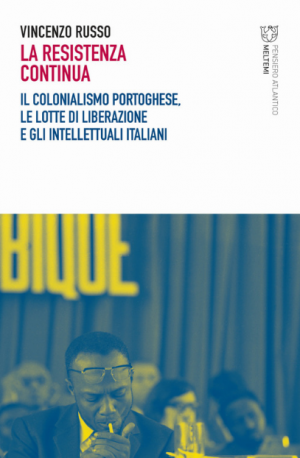Vincenzo Russo, La Resistenza continua: il colonialismo portoghese, le lotte di liberazione e gli intellettuali italiani (Milan: Meltemi editore, 2020). 190 pages. Print and ebook.
Reviewed by Nicola Gavioli (Florida International University)
The second volume of the series Pensiero Atlantico [Atlantic Thought] curated by Roberto Vecchi and Vincenzo Russo, La Resistenza continua is a clear and well-documented study of the international dimension of the debates originated by the fight for independence within African colonies under Portuguese domination. Special emphasis is given to the role that Italy and the Vatican played on the geopolitical stage in the struggles for liberation. A historical
introduction, three chapters, and a final section with selected iconographic and written documents, structure the volume. In a ‘methodological note’ (pp. 28–29), Russo explains how the project was carried out as an attempt to shed light on ‘aspetti marginali o dimenticati’ [marginal or forgotten aspects] of cultural history, following Said’s lesson in ‘contrapuntal reading’ (p. 29). Eduardo Lourenço’s attempts to contrast the various forms of ‘silence’ throughout colonial history and its representation also comes to mind as an immediate reference (on ‘silence’ in Lourenço, see the introduction, co-written by the two curators of the series, to the first volume Del colonialismo come impensato: il caso del Portogallo by Eduardo Lourenço). Following the numerous paths that anticolonialist discourse took in Italy, Russo reconstitutes an as-of-yet unexplored cultural landscape. Readers get to know the ‘heterogeneous constellation of movements’ (p. 12) and organizations born in Italy in which African anticolonialist theories and acts of resistance were followed, discussed, and admired. We are made aware of the synergetic bond established between African leaders, thinkers, and poets and their Italian cultural mediators. Russo re-evokes a period in history (the 1960s and ’70s specifically) in which an emotional and pragmatic political participation was second nature for many Italian activists. The atmosphere in those years — the meetings, the rush to exchange information, the collective sensation of participating in historical revolutionary changes — is strongly depicted in the book; the nostalgia for a more participative society (‘ciò che eravamo come italiani’ [what we were as Italians], p. 140) is also widespread within the pages of the volume. Clearly and vividly written, La Resistenza continua is rigorous in the analysis of its sources and epistemologically ambitious in gathering the vast array of voices and counter-voices within the Italian anticolonial debate during the ’60s and ’70s. Dismantling commonplaces is also a strong quality of the volume.
The author clarifies the fallacy of a binary association that often became commonplace: antifascist and anticolonial thought did not necessarily overlap. No ‘blocco monolitico’ [monolithic block] (p. 21) of Italian anticolonialism or general ‘epistemological’ convergence (p. 21) among participants really existed. Russo explains the reasons for this difference and asks readers to think outside the boxes of overgeneralized and undifferentiated categories.
In Chapter 1, the fascinating figures of Giovanni Pirelli and Joyce Lussu — key cultural agents of numerous material and symbolic exchanges between African and Italian activists — are presented through selected paradigmatic episodes of their intellectual and emotional Bildung. But even if some biographical digressions are vivid and memorable, the book is far from being anecdotal. Each personal ‘snapshot’ serves to recreate the history and the atmosphere of a time in which engagement and cross-fecundation of ideas were widespread.
From belligerent zones of Africa, a corpus of theoretical and poetic writings and speeches (by Agostinho Neto, José Craveirinha and Amílcar Cabral, among others) reached Italian circles and organizations through the intermediary work of Giovanni Pirelli and Joyce Lussu; the latter is of particular interest for her belief in the political act of translation (which she defined ‘eticopoliticopoetica,’ p. 73). In Chapter 2, Russo describes the activities of the Centro Franz Fanon and the holding of the ‘Treviglio Seminar’ (1964) as turning points for the growth of an Italian anti-imperial and anticolonial consciousness. The critical words of Amílcar Cabral are put centre-stage in this chapter as reminders of the ambiguities of Italy. While supporters of the anticolonial cause were numerous in the country, the Italian government continued to provide Portugal with weapons to be deployed in the so-called African ‘overseas territories’. Chapter 3 offers the most memorable and surprising section in the book, in its chronicling of a true coup de théâtre: the encounter of the African leaders Agostinho Neto, Amílcar Cabral, and Marcelino dos Santos with Pope Paul VI on 1 July 1970.
The event, which took place at the Vatican in the guise of a private audience, surprised the international community, scandalized the Portuguese government and its Catholic authorities, and was interpreted as a symbolic gesture in favour of the African freedom fighters. What was the significance of this event? How did it happen? How did the media portray it? Russo contextualizes the facts, registers public reactions, antagonisms, and nuances of interpretation, and shows hermeneutical dispute at work over a short, unprecedented event. The attention to prismatic and contradictory readings of the same event makes this volume particularly timely and resonant with our contemporary cultural climate. The volume ends with the transcription of a pressing Q&A with journalists given by Amílcar Cabral and Marcelino dos Santos the day after their meeting with the Pope in the Vatican.
For clarity of style, rich historiographical research, and narrative precision, La Resistenza continua stands out as a fresh and significant contribution to Lusophone cultural history and its refractions beyond Portugal and its African colonies. A translation of the volume into Portuguese and other languages is therefore desirable to foster its international reception and its inclusion in the bibliography of colonial and postcolonial studies.
